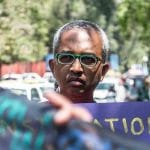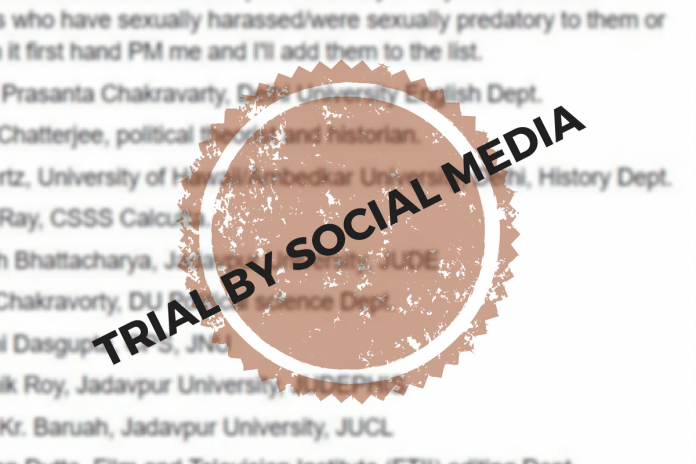I have no patience for anonymous accusers
 C. Christine Fair
C. Christine Fair
Distinguished Associate Professor, Georgetown University
At first blush, I don’t have a problem with it provided that the accuser’s name is clearly identified along with a description of what the person did. I have no patience for anonymous accusers. Transparency is important so that the alleged perpetrator and the victim can confront each other about the event in question.
I wrote #HimToo because some of the men that misbehaved with me (Al and Rob) probably don’t even view their aggressive sexual advances as inappropriate and they probably have never thought about it again even though I think of it often when certain events trigger their memory. I want to educate men like them who think they are simply entitled to behave this way. Then there are the professors like Bosnich, Dipesh, EJ Correy who knew very well what they were doing and how wrong it was.
Ultimately, I want men and the institutions that protect them to reflect upon how such behaviour affects their victims irrespective of their gender. I’d like to think that Al or Rob would be horrified to understand the impacts of their behaviour. I suspect very strongly that none of the professors I call out give a damn about the harm they inflicted. Their misogyny, senses of entitlement and institutional protections are too robust.
I think it is extremely important that we stop focusing upon the victims who have to defend their credibility. I’m tired of defending my credibility. It’s time to ask the perpetrators to defend their credibility.
Frankly, campaigns like #MeToo actually trigger me and require me to do yet more “emotional work”. We don’t need to count the victims among us again and again. We need to identify and count the perpetrators among us.
They remain anonymous while the victims carry the pain around like a millstone. Instead of telling women how to avoid being victimised, we should teach men how not to victimise and hold them accountable for their actions.
The legal system and the evidence it requires virtually assures that we will have no justice. I was part of a class action suit at RAND and I saw that disaster unfold. Real options for justice are limited. It’s a fixed fight and we are fixed as the losers. So maybe it is time to think about this in a radically different way.
‘Sexual Violence Hall of Shame’ is meant to be a preventive measure
 Raya Sarkar
Raya Sarkar It is inescapable that such a list is ‘susceptible’ to unfairly targeting non-abusive men
 Nandita Saikia
Nandita Saikia
Media and Technology Lawyer
Abuse in hierarchical academic communities, as in other communities, can be almost impossible to have addressed. In such circumstances, with stark power differentials coming into play, and future careers possibly being at stake, it’s easy to understand why a person, particularly one perhaps not wielding much power in relative terms, may choose to make an allegation of abuse anonymously.
It may seem like the safest course to that person. Nonetheless, ethical and legal concerns are raised by the purported collation of victim testimonies by a third party, and by the publication of a list of alleged abusers reportedly based on those testimonies.
Such a list arguably goes beyond saying, “Believe victims!” – it requires its audience to believe that specific individuals are abusive without any substantiation whatsoever. There is no doubt that the odds are stacked against victims and that obtaining redress for abuse is difficult, but it is also inescapable that such a list is susceptible to (possibly accidentally) unfairly targeting non-abusive men in addition to naming and shaming actual abusers.
In the long run, the solution lies in strengthening mechanisms to address abuse so that they are accessible and fair to everyone, including the least powerful members of a community.
For now, the question shouldn’t be “How do we shut down the allegations?” but “How do we ensure that the allegations are taken seriously, as all allegations should be, and are fairly investigated?” The latter, if successful, would also have the effect of weeding out baseless allegations, if any.
This manner of naming can delegitimise the long struggle against sexual harassment
 Joint Statement from Kafila
Joint Statement from Kafila
(Signed by: Ayesha Kidwai, Brinda Bose, Janaki Abraham, Kavita Krishnan, Nandini Rao, Nivedita Menon, Pratiksha Baxi, Ranjani Mazumdar, Sabeena Gadihoke, Shikha Jhingan, Shohini Ghosh, Vrinda Grover)
As feminists, we have been part of a long struggle to make visible sexual harassment at the workplace, and have worked with the movement to put in place systems of transparent and just procedures of accountability. We are dismayed by the initiative on Facebook, in which men are being listed and named as sexual harassers with no context or explanation.
One or two names of men who have been already found guilty of sexual harassment by due process, are placed on par with unsubstantiated accusations. It worries us that anybody can be named anonymously, with lack of answerability. Where there are genuine complaints, there are institutions and procedures, which we should utilise.
We too know the process is harsh and often tilted against the complainant. We remain committed to strengthening these processes. At the same time, abiding by the principles of natural justice, we remain committed to due process, which is fair and just.
This manner of naming can delegitimise the long struggle against sexual harassment, and make our task as feminists more difficult.
We appeal to those who are behind this initiative to withdraw it, and if they wish to pursue complaints, to follow due process, and to be assured that they will be supported by the larger feminist community in their fight for justice.
The important thing of course is that the law must take its course against sexual predators
 Arpita Das
Arpita Das
Founder and Publisher, Yoda Press
I feel there are two clear parts to any answer to this question, as is the case usually where social media is concerned. Very often social media can take on a lynch mob mentality, which makes me feel terribly uncomfortable.
At the same time, a lot is happening judicially now because women are speaking out, and very often it is social media, which carries these voices that put an end to the deafening silence around sexual violence. I am all the same an upholder of the concept of privacy.
And I do feel that croudsourcing or publishing names of sexual predators could lead to harm caused to their near and dear ones, their parents, partners or children, which can be dangerous.
The important thing of course is that the law must take its course against sexual predators. And while we must, as feminists, strive towards that goal, perhaps we need to stop short of self-righteous name-calling. A brilliant award-winning film, Boy A, comes to mind in this regard. Where the juvenile perpetrator comes out of prison, is harassed and trolled, till he feels he needs to end his life.
Social media is a mutual approval engine, and a mere ‘name’ shared by a person is considered proof – it’s not
 Anusha Yadav
Anusha Yadav
Founder, Indian Memory Project
If I were to publish names of people whom I have “heard” are alleged sexual predators, half the industries in this country would come crashing down, and wouldn’t that be grand justice served.
Indeed women reporting sexual harassment on social media is encouraging because shaming compensates for the grossly uncooperative laws for women under threat. But when one person crowdsources names based on hearsay of whisper networks, without any substantial context, evidence or testimonies, it can have horrible consequences.
Women must share their experiences however, whenever, wherever and with whomsoever they choose, but a “trial by internet” on crowdsourced names of alleged sexual predators without substantiated contexts or claims is hugely problematic. There is no room for judicial rendering or rights of the accused.
People have had their lives destroyed based on such accusations that have later proven to be false. Social media has given a voice to women, but it’s also a weapon of mass reputation destruction on an unimaginable scale because the internet never erases your ‘opinion’ if you are proven wrong.
I do not presuppose that the names that are shamed online are bunkum, but without any substantial verification, they are not yet guilty. People assume that their participating in a shaming campaign is democratisation of justice, instead they provoke personally, professionally, and morally damaging consequences.
Social media is a mutual approval engine, and a mere ‘name’ shared by a person is considered proof – it’s not; it’s hearsay and without any substantial context no one can get justice. It weakens all due process for survivors, opens them up to libel, and diminishes the efforts of hundreds of people working on just procedures of accountability on their behalf.
There is a good reason why NYT took time to gather proof and tie up all loose ends, legally and morally. They ensured that Weinstein could not wiggle himself out of his crimes.
With the advent of right to privacy as a fundamental right, these social media posts are in a legal grey area too
 Raghav Pandey
Raghav Pandey
Research Fellow with Department of Humanities and Social Sciences, IIT Bombay
There is usually a debate on revealing the identity of victims of such crimes, but there is hardly any debate when it comes to revealing the identity of the perpetrator. Most people will agree that there can’t be anything wrong with it. After all, someone who has committed such a crime, should definitely be named.
In fact, countries like the USA, the UK, Australia and Canada etc., maintain a sexual offender registry. Where the government itself collates data of such criminals; but only the USA makes it publicly accessible. Indian Government is also planning to set up such a registry.
However, publication of an allegation of such a crime on social media, is to be looked with scepticism.
First of all, an allegation is a mere accusation and doesn’t necessarily mean that the person has committed the crime. Secondly, social media has an intrinsically anonymous nature and can be misused for defamation of bona fide and unsuspecting individuals.
With the advent of right to privacy as a fundamental right in India, this is in a legal grey area too. Having said that, publication of such information can actually lead to a significant decline in such cases.
Hence, such publications can be allowed only through verified social media accounts, so in the event of a false publication the erring party can be identified and brought to book. Use of social media is critical because in such cases, usually the victim is unwilling to reveal his/her identity. Social media can play a role in preserving the anonymity.
A mechanism, where a victim reports about the offence to a verified social media account, which can check the authenticity of the claim before publishing and not reveal the identity of the victim, will function best.
In such a terrain, the price women and the women’s movement pay for making an error is steep
 Sanya Dhingra
Sanya Dhingra
Reporter, ThePrint
Women never have it easy. Socially speaking, the burden of proof always remains on the woman to establish lack of consent in a case of sexual assault, as opposed to a victim of a non-sexual violent assault, who is typically trusted for being on the receiving end of “uninvited” violence. The collective distrust in the version of the woman is hardly waning.
In such a terrain, the price women and the women’s movement pay for making an error is steep. The society has enormous sympathy for men who commit crimes against women. They’re invariably given the benefit of doubt.
In fact, when it comes to the debate around marital rape, most worry about the fate of the poor husband, which would hinge on the whims of a conniving wife. Imagine the cost women will collectively have to pay even if five of the 58 academics crowdsourced and named by Raya Sarkar in her Facebook post are innocent. Imagine the number of women whose testimonies would be questioned and dismissed as social media fads or mobocracy for years to come.
This is, of course, not to question the intentions of the women who have sent out names of harassers or Sarkar herself. This is not to question the need to jolt the intellectual upper-caste elite out of its holier-than-thou snobbery either.
There certainly is strength in numbers, and rightly or not, there is strength in anonymity too. But this strength must not come at the cost of due process, because if it does, it will ultimately come back to bite women.
 It is not feminist to ask other women to either follow the legal way or shut up altogether
It is not feminist to ask other women to either follow the legal way or shut up altogether
Neera Majumdar
Journalist, ThePrint and alumni of Jadavpur University
It is not feminist to ask other women and survivors to either follow the legal way or shut up altogether against sexual assault.
When I read the list published by Raya Sarkar, I was hardly surprised. Some names were known to me since I had been a student of Jadavpur University. The very university that equipped me to speak out, like most other well-known institutions was protecting their own.
The list does many things: it shows you the gravity of the problem, it questions the thought that great academics must be good people too, it shows you that sexual assault isn’t a one-off abnormality.
On the other hand: the list is mostly based on spoken testimonials. Here we enter murky waters. For now, we are toeing the fine line between hit-list and empathy.
There is no doubt of the strength in numbers and anonymity in a society which has hierarchies based on gender, class and caste. Power dynamics in institutions and fear of lengthy and due processes force most victims to stay quiet. Except sometimes collaborative bursts like #MeToo provide a space to speak out.
The list, however, is not saying #MeToo but #TheseAcademics. To write it down in concrete and run the risk of it being faulted or false, the fingers will point to victims and minorities again. Which will also be hardly surprising, like the list in itself.
People have a right to expose alleged offenders for their wrongdoings
 Darab Farooqui
Darab FarooquiLet’s look at the problem in a different way? What if, a real estate builder is fleecing people of their hard-earned money? If people, who have been duped, decide to put up the builder’s name on social media, would it be wrong? Or if one exposes a corrupt politician on social media? Or a doctor, who is known for his malpractices?
In any of the above cases, people have a right to expose alleged offenders for their wrongdoings. So why not publish names of sexual predators using social media?
Now, let’s look at another problem. There is a risk of disruption of public and private life of that sexual predator. Why should the wife/husband, children or rest of the family suffer, for what the sexual predator has done? This argument is by default, pitiful. Because it’s the sexual predator who is responsible for this sorry state of their family, not the victims.
I personally feel they should be named and shamed. Period.
However, we should do our diligence before we name or shame anyone. It’s easy to be emotional and very hard to be responsible. Be diligent but never forgive who are wrong.
The list encourages other survivors to speak up, and also serves as sufficient warning
 Vandana Menon
Vandana Menon
Journalist, ThePrint
Social vigilantism of any kind needs to placed within context. The recent list of predatory professors/academicians that was published on Facebook the subsequent spreadsheet entitled “Sexual Violence Hall of Shame” was done by students, and for the safety of other students- and remembering that is important.
While placing accusations and blame on reputable people is risky, I believe there isn’t any smoke without a fire. In university spaces where students work closely with professors and mentors who are often put on a pedestal and idolised, students find themselves in vulnerable positions. If any kind of harassment occurs, the immediate power differential makes it difficult to firmly establish boundaries and ensure justice. This list, therefore, was intended to make students aware of any possible predators around them, and only serves to function as cautionary.
The sheer volume of the response confirms some of our worst suspicions. Speaking as an ex-student of Christ University, it was an open secret that one of the professors had engaged in sexual misconduct, and the spreadsheet now has multiple voices who have alleged the same. This means that it is still happening, and he could still be harassing current students, who need to be more aware of the threat they are facing.
Of course, the same debate on impact vs intent arises. The list is anonymous, and therefore treads on the verge of being discreditable, but it should not be ignored. If anything, it shows how prevalent the threat it is. In this context, therefore, this crowd sourcing is entirely justified. It might run the risk of false accusations, but it encourages other survivors to speak up, and also serves as sufficient warning.
I support the list because it does not put the onus on women
 Ekabali Ghosh
Ekabali Ghosh
M.A. Student, Jadavpur University, activist, and co-founder Women Against Sexual Harassment
I support the list because it does not put the onus on women. The onus is on the abuser for a change.
As a student in a reputable institution rubbing shoulders with elite students, I have seen how powerful the influence of an abuser can be. A whisper there, a word there and there goes your PhD dream. Still want to persist in your fight against sexual harassment? There will be public shaming.
What academics busy with condemning the list are not talking about is why the need for this came up. Obviously students are frustrated with the way these academics have known for ages that certain men are predators and yet have gone on socialising with them.
We think we have the ICC, we think we have the courts. But the ICC refuses to give verdicts citing technicalities and the courts are too traumatic.
I happen to be fighting for justice myself. Legally. And I know how horrid it is to be in this situation. I have been publicly shamed by my abuser but have not been able to talk about it due to legal binds. I feel stifled.
I think these privileged abusers want us to lodge complaints because complaints are easier to dismiss. And force them under the rug.
But we women won’t compromise. Whether it is for Farooqui, my abusers, abusive professors, Harvey Weinstein, and Dipesh and Partha *insert their upper caste surnames*. My sisters from across races, castes, sexuality and the spectrum, we are all in this together. It’s do or die for us. And we don’t want to die. Not today. Not ever.
The US has a National Sex Offender Registry, which categorises sex offenders-has that stopped people from “grabbing pussy”? No
 Ratnabali Bhattacharjee
Ratnabali Bhattacharjee
Actor, scriptwriter of Ladies Room
The US has a National Sex Offender Registry, which categorises sex offenders according to the nature of their abuse, and this list is available on a website, accessible to the entire public. Has that though stopped people from “grabbing pussy”? No.
But I’d like to believe that it has given women some sort of a sense of security – they can look up the registry and know, and god knows this knowledge is needed, for more reasons than one. But again, has it stopped the abuse so freely available across the country? No. But maybe, just maybe it has stopped even one man from abusing – I don’t know, I conjecture, with hope.
The list cannot be a pointless one. If your name is on the list, you WILL be tracked by the government, you will have to lead a horrendously restricted life— that cannot be a scenario one wouldn’t mind.
The American registry of course is related to cases which have been dealt due course by law. It is not a crowd sourced list. The latter can have misinformation. By that same logic, it can also be an honest list of actual, horrendous perpetrators.
Doing this via social media is only what should be the beginning.
This is data being collected – needs to be handed over to investigation, and let the law take its course. This needs to be done WITHOUT making it a god-awful process for the survivor. And this should not become a non-functioning process. For the life of me I cannot understand how the Nirbhaya funds still remain unused.
Kangaroo courts offer no justice.
 Ashley Tellis
Ashley Tellis
LGBT rights activist and independent academic, journalist, and editor
This morning a journalist friend informed me that I had just been added to the Sexual Harassers List being circulated on the internet. Last evening, I had been discussing my reservations about this list and its implications with a feminist colleague on a Facebook thread. I was charmed.
I was actually accused of sexual harassment in Delhi University in 2003. We had fought long years to formulate a strong and representative policy on sexual harassment and it had just been put into place. This was, of course, met with horror and the need to trivialise the issue by the male establishment.
It was the end of the academic year and several students were being held back over lack of attendance. One of them, a woman, was told that if she filed a sexual harassment complaint against me, she would get her seat. She obliged. She asked another student to join her, who refused, and informed me.
This was to be a fitting lesson to supporters of the sexual harassment policy. I asked for the procedures to begin so we would see the policy in action. Of course, nothing was done.
As someone systemically sexually harassed for almost two decades in educational institutions across India, and fighting the almost always losing battle against it, I know there is no alternative to the fight against it on the ground.
This list trivialises that fight and is only going to strengthen the backlash against attempts to take sexual harassment seriously. Kangaroo courts offer no justice.







It is absolutely fair to post the names in social media. When one does not get justice anywhere and is subjected to oppression everywhere, it is absolutely right. Had the system of getting justice been fair, there would b no need of such a move.
What if someone puts your name on the list? Without any checks or even a basic due process, anyone can add any name — this does not help the victims, it helps the actual offenders because they can claim innocence by saying other innocent people have also been listed. Let’s keep working to make the system better because there is no alternative to a fair system.